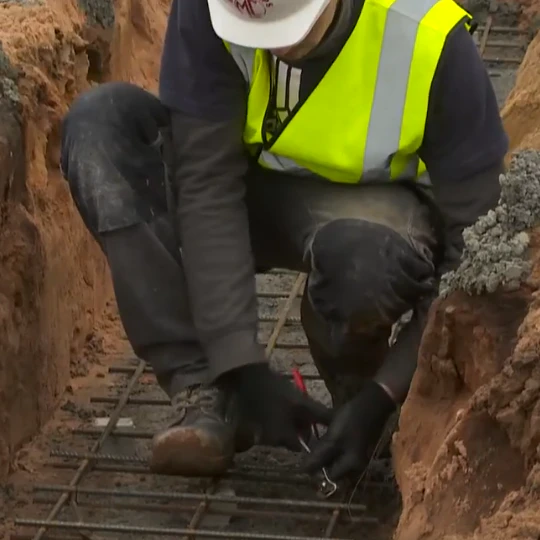What does a groundworker do?
Groundworkers are the backbone of the construction industry. They are involved in a variety of tasks that lay the foundations for a project’s success. From clearing construction sites and digging trenches for foundations to setting up construction sites with safety measures, huts and barriers, their tasks are varied. Groundworkers carefully follow health and safety regulations, assist with excavation work, interpret drawings and specifications and carry out activities such as laying sidewalks, concreting construction sites and diverting watercourses
Required skills
A groundworker needs physical fitness and stamina to perform demanding tasks effectively. The ability to interpret technical drawings and specifications is critical to accurate project execution. The ability to operate heavy machinery is essential for site preparation and construction work. Strong teamwork and communication skills are required to collaborate with colleagues and ensure a smooth workflow. In addition, compliance with health and safety regulations is vital to maintaining a safe working environment and avoiding accidents on site.

Qualifications
To start a career as an groundworker, gaining a Level 2 NVQ Diploma in Construction Operations and Civil Engineering is essential. This qualification opens the doors to gaining the esteemed blue CSCS card, a badge of competence and safety awareness in the construction industry
Benefits
Being a groundworker offers significant benefits, including job security due to the high demand for skilled professionals in the field, ensuring a stable career. Groundworkers also enjoy varied work environments, ranging from urban construction projects to rural developments, providing diverse and dynamic experiences. This combination of stability and variety makes a career in groundwork both rewarding and engaging.
Challenges
Despite the rewards, groundworkers face challenges. The work can be physically demanding, requiring endurance and strength. Weather conditions can also pose challenges, making outdoor work unpredictable. Adhering to tight schedules and dealing with unforeseen issues on construction sites are part of the job’s challenges.
Career path and progression
Groundworkers can progress into roles such as:
Continuous professional development and the acquisition of additional qualifications improve career prospects
Statistics
Groundworkers in the UK* – Prognosis
Average Annual Increase
ARR**
SOURCE: CITB ” Labour Market Intelligence Report (2024 – 2028)”.
* These prognosis calculations assume constant ARR and growth rate without significant external disruptions.
** ARR – Annual Recruitment Requirement is a metric used to estimate the number of new workers needed annually to meet labour market demands in a specific industry, region, or occupation.
How much could you earn as a groundworker
Groundworkers in the UK earn varying wages based on experience and employment status. Entry-level employed workers earn around £14.50 per hour (£27,200 annually), while experienced ones can earn up to £22 per hour (£41,500 annually). Self-employed individuals charge approximately £18 per hour, with daily earnings ranging from £144 to £220, depending on experience and location.
*Information sourced from reputable recruitment sites and agencies, reflecting the latest job market insights and trends. Figures can vary based on factors such as specific job requirements, individual qualifications, and regional economic conditions. Additionally, self-employed professionals should account for expenses such as tools, materials, insurance, and transportation when calculating their net earnings.
Typical hours per week
Standard work hours per week
(Employed)
Working hours per week with overtime
(Employed and Self-employed)
Groundworkers typically work around 40 hours per week. However, the nature of construction projects can lead to variations in working hours. Overtime may be required to meet deadlines, especially on larger projects. The flexibility in hours often comes with compensation and reflects the dynamic nature of the construction industry.
Conclusion
A career as a groundworker is not just about digging dirt; it’s about laying the foundation for dreams to materialize. Groundworkers play a critical role in shaping infrastructure, from urban landscapes to rural developments. This career offers job security, diverse work environments, and the satisfaction of contributing to lasting projects. If you have the skills, stamina, and passion for shaping the built environment, the role of a groundworker could be your perfect fit in the construction industry.

